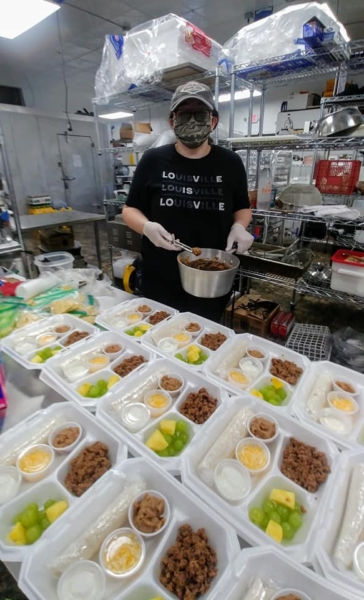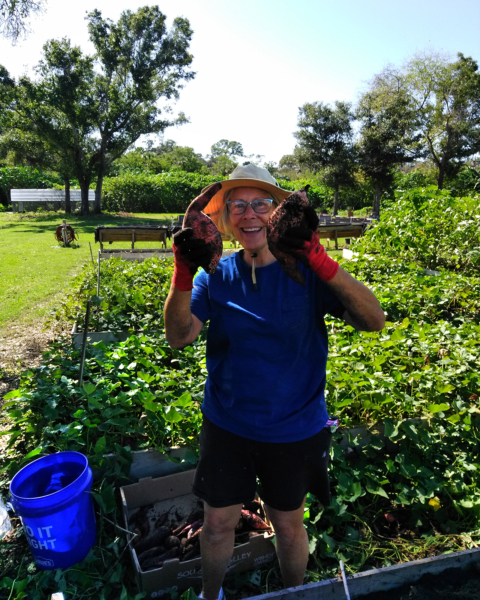[Episcopal News Service] A Caring Place didn’t start as a feeding ministry. When the upstart nonprofit in Lexington, Kentucky, was founded last year by members of two closely aligned Episcopal and Lutheran congregations, its primary mission was to alleviate feelings of isolation and loneliness among senior citizens in the area. One initial plan was to gather seniors for conversation over donuts once a week.
A Caring Place only hosted one such gathering, in March 2020, before the coronavirus pandemic forced widespread cancelation of in-person activities to slow the virus’ spread, but organizers’ emphasis on providing food to participants only grew.
“Food sources were drying up for a lot of people,” said Roxanne Cheney, a member of St. Martha’s Episcopal Church who chairs A Caring Place’s board. At the onset of the pandemic, Meals on Wheels and other local feeding ministries suspended or reduced their services, so “these people who were in our program had no way to feed themselves.”

Volunteers with A Caring Place, which started as a joint Episcopal and Lutheran ministry, prepare hot meals every weekday and distribute them to 20 senior citizens in Lexington, Kentucky. Photo courtesy of Roxanne Cheney
To fill that gap, A Caring Place implemented its own full-fledged feeding ministry, which now delivers hot lunches to about 20 recipients, five days a week. In October, the ministry was among the recipients of grants from The Episcopal Church’s United Thank Offering, or UTO, which focused this round of grants on supporting ministries that are responding to the pandemic in their communities.
The grants approved by Executive Council totaled $450,000 to support 21 ministries within The Episcopal Church and an additional five around the Anglican Communion. They offer a range of responses to the pandemic, and A Caring Place is one of several recipients focused on feeding ministries.
“This UTO grant that came along is just a godsend,” Cheney told Episcopal News Service. A Caring Place, which started as a joint ministry of St. Martha’s and Word of Hope Lutheran Church, will use the $20,800 to purchase enough ingredients to continue providing hot lunches to low-income and homebound residents for up to a year. Commercial kitchen space was donated, and volunteers came forward to prepare and distribute the meals.
“We’re feeding the soul and the body,” Cheney said.
The pandemic has brought renewed attention to many chronic community needs, though the needs served by feeding ministries are “at the base of the pyramid of survival,” said Sherri Dietrich, president of the UTO board.
“Nine of the 26 grants UTO funded this fall will ensure that thousands of people around the United States and the world will have food to help them survive this pandemic,” Dietrich said in an email. “And I know that these ministries will also offer other support and embody the love of Christ to those they serve.”
In Jasper, Alabama, St. Mary’s Episcopal Church received a $10,000 UTO grant to buy a walk-in cooler and freezer for its food bank, which will allow church volunteers to provide milk, cheese and fresh produce to local residents struggling during the pandemic.
Another $10,000 grant was awarded to the Church of the Guardian Angel in the Diocese of Maryland. The church’s food pantry provides bags of groceries and household supplies to more than 70 households in Baltimore, and during the pandemic, the grant will allow the pantry to hire a part-time director to help respond to increased demand.
UTO also is helping to sustain Charlie’s Place, a feeding ministry in the Diocese of Washington. With its $25,000 grant, it can continue serving meals five days a week to neighbors struggling with food insecurity, some of whom also come to Charlie’s Place for a range of other services, such as haircuts, fitness classes, medical checkups and clothing.
And in St. Petersburg, Florida, UTO is building on its previous support for Benison Farm, which makes use of formerly vacant land at St. Augustine’s Episcopal Church.
The historically Black congregation, through a partnership with the mostly white congregation of St. Thomas Episcopal Church, got the gardening ministry up and running after receiving an initial UTO grant in 2018. Volunteers had begun distributing Benison Farm’s fresh produce to food pantries and at a church farmers market when the pandemic disrupted both harvesting and distribution.

After a pause in planting and harvesting over the summer at Benison Farm in St. Petersburg, Florida, Episcopal volunteers have resumed harvesting fresh produce for distribution in the neighborhood around St. Augustine’s Episcopal Church. Photo: Martha Goodwill
“When things first shut down, we just lost almost all of our volunteers,” said the Rev. Martha Goodwill, a deacon at St. Thomas who has helped coordinate the food ministry. Schools stopped sending students to work in the churches’ gardens, Goodwill told ENS, and the threat of COVID-19 decreased turnout among members of St. Augustine’s, many of them senior citizens who are more vulnerable to severe complications.
Goodwill, however, saw a silver lining in the pandemic’s timing. Summer, because of the heat, typically is an off season for planting in Florida. Benison Farm took advantage of the down time and, with its remaining volunteers, doubled its planting capacity by adding 24 more raised beds. In October, it received a new UTO grant of $25,000 to add facilities to handle the increased harvest of greens, onions, cauliflower, broccoli, sweet potatoes and eggplant.
“Now that we have twice the produce, we need the ability to harvest and clean it and store it,” Goodwill said. With the grant’s help, the farm will be able to store larger amounts of food until it’s ready to be delivered to one of the local food pantries. The monthly church farmers market will resume in December.
Benison Farm’s mission always has focused on providing fresh, healthy food in St. Augustine’s neighborhood, which has been identified as a “food desert,” an area with limited access to healthy, affordable food sources. “There are people who can afford fresh produce … but they don’t have access to it,” Goodwill said.
The need is especially great in St. Augustine’s neighborhood, which has a large Black community. The pandemic has hit people of color particularly hard. Black, Latino and Native Americans are about five times as likely to be hospitalized for COVID-19 as white Americans, and African Americans are twice as likely to die from it, according to the Centers for Disease Control and Prevention. The CDC notes that a variety of underlying causes are to blame, including disparities in access to health care and greater occupational risks.
In Lexington, A Caring Place expanded its Comfort Care Phone Program during the pandemic, with 46 residents now receiving regular check-in phone calls from program volunteers. “It’s like a pen pal, but it’s a phone pal,” Cheney said. Some of those participants also have enjoyed joining others in conversations on various topics during A Caring Place’s hour-long Virtual Welcome Center sessions, held at least twice a week on Zoom.
The feeding ministry, meanwhile, is limited to participants whose finances fall below 130% of the federal poverty line. The UTO grant will feed 16 participants for a year, and A Caring Place has now extended its outreach to 20 meal recipients.
Volunteer Sharon Asbury plans the meals and purchases the ingredients, and with help from family members, she gets up early each weekday to prepare the meals so they are ready to be delivered starting at 9 a.m. Other volunteers take turns as delivery drivers, and one delivery shift usually takes about three hours to drop off the meals at the homes of each recipient.
COVID-19 has limited the amount of interaction between volunteers and the people they feed, but Cheney said it still is serving A Caring Place’s broader goal, “to reach out as Jesus did to those who had nothing and to show compassion and mercy.”
– David Paulsen is an editor and reporter for Episcopal News Service. He can be reached at dpaulsen@episcopalchurch.org.
This post appeared here first: UTO grants help feeding ministries expand to meet needs of communities hit by pandemic
[Episcopal News Service – Top Stories]
